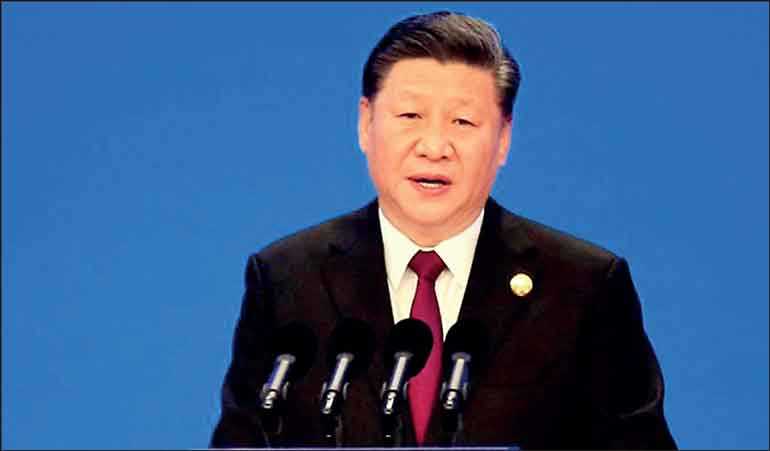Sunday Feb 22, 2026
Sunday Feb 22, 2026
Friday, 7 December 2018 00:00 - - {{hitsCtrl.values.hits}}

At the opening ceremony of the first China International Import Expo (CIIE) that was just concluded, President Xi Jinping pointed out that holding the CIIE is “China’s major initiative to still widen market access to the rest of the world”, and that it “demonstrates China’s consistent position of supporting the multilateral trading system and promoting free trade”. 
Indeed, to uphold economic globalisation and free trade, China actively applied to join the World Trade Organization (WTO) and since its accession to the WTO, China has been a staunch supporter of the multilateral trading system, taking firm position against protectionism, and actively promoted building a more open and inclusive world economy.
It can be said that from the General Agreement on Tariffs and Trade to the WTO and up till now, with the joint efforts of all its members including China, WTO has made significant contributions to promoting the liberalisation and facilitation of trade and investment, and has greatly boosted global trade development and economic growth.
Nevertheless, the world economy is going through profound adjustment, and protectionism and unilateralism are resurging. Economic globalisation faces headwinds, and multilateralism and the system of free trade are under threat. WTO is facing three crises threatening its survival: first, it is about WTO’s dispute settlement mechanism.
The Appellate Body of the mechanism has seven members initially, but now there are only three of them. The appointment of the rest four is thwarted by individual members; second, individual members add tariffs, misusing the security exception clause in the WTO rules; third, a small subset of individual members adopt unilateral measures and ignore WTO’s multilateral rules.
This year marks the 40th anniversary of China’s reform and opening-up. Over the past 40 years, it is the strong belief in reform and open economy that has brought up today’s China.
A country must keep pace with the times, and so are international organisations. WTO is no exception. We need to re-examine its rules and regulations and duties, enabling it to continue to play an active role under the new historical conditions. Thus, China firmly supports necessary reform of the WTO and meanwhile, we believe that reform should be in the right direction and taking the right approach. To this end, China has put forward three basic principles and five suggestions on WTO reform.
Three basic principles on WTO reform
The three basic principles are as follows:
First, the WTO reform shall preserve the core values of the multilateral trading system. We believe that non-discrimination and openness are the most important core values of the multilateral trading system. The WTO members should obey this while handling economic and trade relations with other members within the framework of multilateral rules.
Second, the WTO reform shall safeguard the development interests of developing members. The reform should provide developing members with flexibility and policy space needed for their economic development, contributing to the United Nations 2030 Agenda for Sustainable Development and narrowing the North-South gap.
Third, the WTO reform shall follow the practice of decision-making by consensus. Reform is related to the future of the multilateral trading system. The choice of reform agenda and the final outcomes should be decided through consensus. The process shall be inclusive and open to all members, especially the developing ones.
Five suggestions on WTO reform
China has five suggestions for the reform of the WTO:
First, the reform should uphold the primacy of the multilateral trading system. The reform should reinforce the centrality of the multilateral trading system in international trade liberalisation and facilitation. It cannot be confused with the so-called new concepts and new expressions and we cannot deny the authority of the multilateral trading system.Second, the priority of the reform is to address the key issues that threaten the survival of the WTO. The reform should rein in actions of unilateralism and protectionism with the strings of the WTO rules. It should solve urgent problems including the appointment blockage of Appellate Body members as soon as possible and ensure the smooth functioning of all aspects of the WTO.
Third, the reform should address the imbalance of trade rules and respond to the latest developments of our time. The reform should address the excessive agricultural subsidies of some developed members and prevent abuse of trade remedy measures. Meanwhile, the reform should promote the WTO rules to keep pace with the times and respond to the needs of the economic reality of the 21st century.
Fourth, the reform should safeguard the special and differential treatment for developing members. China is the largest developing country in the world, and is willing to take up commitments commensurate with its level of development and economic capability. However, China will never agree to be deprived of its entitlement to special and differential treatment as a developing member.
Fifth, the reform should respect members’ development models. China opposes some members who deny the diversity of development models and discriminate against different ones. China disagrees on incorporating the development model issue into the WTO reform agenda.
It is noteworthy that all the principles and suggestions are not intended for serving China’s own interests. They are put forward so that all WTO members could work together to uphold the multilateral trading system, promote WTO to develop in a fairer, more open, inclusive, efficient and authoritative way, and enable it to play a more significant role in global governance.
China firmly observes and upholds the WTO rules, and supports the multilateral trading system that is open, transparent, inclusive and non-discriminatory. China has participated in all aspects of WTO work, made its voice heard and contributed its own proposals on improving global economic governance.
China is an active participant, strong supporter and major contributor in the multilateral trading system. And while actively developing itself, China also pursues an open strategy of mutual benefit and win-win results, and is willing to offer more public goods to the international community.
China proposes the “Belt and Road” Initiative, openly supports globalisation, and strives to make the pie of the global economy bigger in helping countries to achieve their own development goals.
To demonstrate our firm determination to support economic globalisation, China has just held the first CIIE in Shanghai. The CIIE has not only provided countries with new opportunities to expand exports to China, but also established a platform for them to carry out trade activities and share business opportunities with each other. This clearly shows China’s responsibility as a major nation in actively promoting economic globalisation.
China and Sri Lanka
Sri Lanka actively participated in the first CIIE. There are altogether six Sri Lankan government organisations taking part in the National Pavilion and 29 quality companies in the Business Exhibition. Sri Lanka Export Development Board (EDB), which organised Sri Lanka’s participation in the CIIE, indicates that Sri Lanka’s participation this time was a huge success with fruitful results.
EDB thanked China for providing Sri Lanka with such a broad cooperation platform and looks forward to participate in the next CIIE. Hence it can be seen that an open world economy which China upholds has benefited not only itself, but also the whole world. Meanwhile, it has brought tangible benefits to Sri Lanka.
Both China and Sri Lanka are developing countries, so we could better understand the importance of an open, inclusive and fair multilateral trading system to our own development, and the necessity of WTO reform under the current situation of rising unilateralism and protectionism.
Located at the centre of the Indian Ocean, Sri Lanka has acted as a regional trade centre since ancient times. Sri Lanka has not only played its role as a “central node” in promoting global trade development, but also benefited a lot from the free trading system. The biggest common issue facing China and Sri Lanka, both as developing members in the WTO, is development which is the core mission of the WTO. Currently, some developed members question the necessity of special and differential treatment on the pretext of significant economic development of some developing members. This runs counter to the WTO rules and violates the interests of the vast majority of developing members.
Holding the same expectation for a more open and inclusive multilateral trading system, China is willing to work together with Sri Lanka in upholding the unity and development space of developing members and making our concerns be fully considered and properly dealt with.
China and Sri Lanka are traditionally friendly neighbours. In history, Master Fa Xian came to Sri Lanka to learn Buddhism, Zheng He Fleet visited Sri Lanka five times, and our two nations signed the famous “Rubber-Rice Pact”; at present, the “Belt and Road” Initiative has opened up new channels for our economic and trade cooperation and people-to-people contacts, and the China International Import Expo offers the whole world, including Sri Lanka, a new trade sharing platform; in the future, with the deepening of friendship and closer economic and trade ties between our two countries, we will definitely strengthen cooperation in the global governance system including WTO, defend our common interests, and promote building a community with shared future for China and Sri Lanka.
Economic globalisation and the multilateral trading system are irreversible trend of history, independent of people’s will. China’s economic growth over the past 40 years has been achieved with a commitment to opening-up. In the same vein, high-quality development of China’s economy in the future can only be guaranteed with greater openness.
In the meantime, we believe that Sri Lanka’s development must also be rooted in an open and inclusive multilateral trading system and global economic system. China looks forward to working with Sri Lanka to share opportunities and jointly meet challenges. Together, let us promote WTO reform to be fairer, more open, inclusive, efficient and beneficial for all, make economies of the world interconnected, build a higher-level open world economy, and deliver the benefits of free trade to every corner of the world.
(The writer is Ambassador of China.)